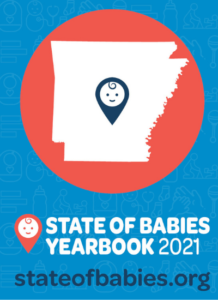
How does Arkansas measure up when it comes to implementing policies and programs that help babies reach their full potential? As ZERO TO THREE’s the State of Babies Yearbook: 2021 shows, even before COVID-19, the littlest among us faced big challenges. Most alarming, the report shows there were significant disparities across key indicators of well-being, particularly among babies of color.
The State of Babies Yearbook: 2021 provides a snapshot of how babies are faring across nearly 60 data points in areas essential for a good start in life: Good Health, Strong Families, and Positive Early Learning Experiences. According to the Yearbook, 28.4 percent of babies in Arkansas were living in poverty before COVID-19.
Exploring the numbers by race and ethnicity presents a clearer picture, revealing as many as 48.8 percent of Black babies and 29.9 percent of Hispanic babies in our state were already living in poverty compared to 21.9 percent of 2hite babies. Because of historical and structural inequalities, children of color face some of the biggest obstacles, such as low birthweight, unstable housing, and limited access to quality child care.
Research shows a baby’s brain develops faster from birth to age three than any other period in life, forming more than one million new neural connections every second. When babies have the support they need, those connections are stimulated and strengthened, laying a strong foundation for the rest of their lives. Otherwise, their development can suffer, with potentially lifelong developmental, educational, social, and health consequences.
At Excel by Eight, we believe every baby deserves to reach his or her full potential—no matter where they’re born, the color of their skin, or family’s income. That’s why Excel by Eight Foundations set a goal to expand the number of pregnant women, infants, and toddlers receiving high-quality health and education services by more than 35,000 and close the gaps between all demographic subgroups. We will achieve this by increasing the number of pregnant women, infants, and toddlers:
- receiving screenings and supportive services that improve health and education outcomes;
- served by high-quality home visiting models; and
- enrolled in high-quality early childhood education programs.
We hope you will learn more about our detailed policy agenda and goals by clicking here. For more information about our progress, sign up for our newsletter here.
